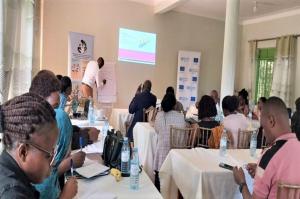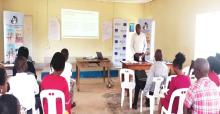WHO Uganda campaigns against sexual misconduct in Ebola-affected districts
When a public health emergency strikes, it leaves more than just a medical footprint—it exposes deep social vulnerabilities and tests the resilience of communities. In the districts of Fort Portal, Kabarole and Kyegegwa, in western Uganda, the recent Ebola outbreak did not only affect health of individuals, health care delivery and disruptions in services but caused a drift in social-economic and psychological vulnerabilities impacting production rates and risks for economic threats.
While the virus was eventually contained, the outbreak revealed stark economic and power imbalances, especially between communities and responders. These disparities heightened the risk of sexual misconduct, disproportionately affecting women, children, persons with disabilities, and the elderly. Sexual exploitation, abuse and harassment undermines not only individual dignity but also the credibility of response efforts by the Government of Uganda, World Health Organization (WHO), and partners.
In response, WHO, with support from the European Civil Protection and Humanitarian Aid Operations (ECHO), launched a strategic capacity-building initiative to strengthen community resilience and safeguard human dignity. This initiative focused on equipping frontline health workers, district leadership, cultural, religious, and community leaders with the knowledge and tools to prevent and respond to sexual exploitation, abuse and harassment.
“In every emergency, safeguarding the population against sexual misconduct must be as urgent as the medical response. When communities are equipped with knowledge and tools, they become the first line of defense for the entire population,” said Dr Jackline Karungi, the Prevention and response to sexual exploitation, abuse and harassment officer at WHO Uganda. “This training is not just about policies—it’s about restoring trust, protecting dignity, and empowering communities to stand against sexual misconduct.”
The sessions brought together 83 participants, including health workers, social workers, community development officers, district leaders, and representatives from schools in Kabarole, Fort Portal and Kyegegwa. The sessions featured interactive discussions, scenario-based learning, and engaging group discussions.
“The training was a powerful reminder that protection starts at the community level. By working closely with local leaders and frontline workers, we are building skills, trust and accountability. These are the foundations of a resilient health system,” said Dr Philemon Kabagambe, WHO Uganda western regional hub coordinator.
Participants explored key sexual misconduct prevention strategies, reporting mechanisms, referral pathways, and victim assistance services that uphold the dignity and rights of survivors and those at risk. Special emphasis was placed on inclusivity, and the specific needs of vulnerable populations.
“We now understand the link between sexual exploitation, abuse, harassment and gender-based violence. We are ready to protect our communities,” said Jenifer Biira, a midwife, Kyaka II Refugee Settlement
Nelson Tusabe, a medical officer at Kyegegwa general hospital, observed, “Responders paying for sex being described as sexual exploitation was a new and interesting concept. I have also learnt that my role is to report, not investigate. So, I am ready to play my part.”
Participants reported increased confidence in identifying and responding to sexual misconduct incidents and a deeper understanding of ethical obligations. Community protection networks and referral pathways are being reinforced, ensuring that survivors receive timely and appropriate support.
“Before this training, I didn’t know how to respond if a colleague approached me with a case of sexual harassment and yet these cases are very common. I will continue creating awareness among colleagues,” said Catherine Kemigabo, a senior health educator, from Fort Portal.
WHO will conduct follow-up mentorships with the trainees to ensure knowledge retention and transfer to colleagues and practical application in the communities they serve. The feedback from participants will guide future capacity-building efforts.




